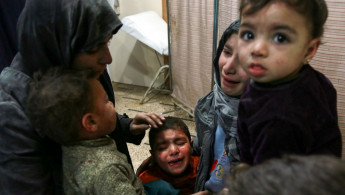Week of Eastern Ghouta bombings kill more than 500
More than 500 civilians have been killed in the Syrian regime's bombing of Eastern Ghouta this week, with hundreds more critically injured and in urgent need of medical assistance.
The death toll of the regime's seven-day killing spree on the besieged opposition enclave rose to 520 on Saturday, while more than 2,500 civilians have been injured, the Syrian Observatory for Human Rights.
Among the dead are 127 children and 75 women, while food, water and medicine are running critically low due to the regime siege on Eastern Ghouta.
Essential services have ground to a halt due to the relentless air raids.
Many of Eastern Ghouta's residents have been living underground for the past week to escape the incessant bombardments, but shelters have now run out of food and water.
Collapsing from exhaustion
Ten medical facilities have been destroyed over the past seven days, the Syrian Observatory for Human Rights said, while roads are often too unsafe or unpassable to allow ambulances to rush the injured to hospital.
Doctors Without Borders [MSF] said 13 health centres have been hit by bombs or shells rendering the situation desperate for doctors and nurses.
Medical staff in Eastern Ghouta have been working tirelessly to save the dying, but with no break in the bombing MSF fears doctors and nurses will begin to collapse due to exhaustion.
"Casualty numbers in Syria's besieged East Ghouta enclave are soaring beyond imagination as the capacity to provide healthcare is in its final throes," MSF said in a statement.
The UN Security Council agreed a ceasefire proposal on Saturday, but concessions to Syrian regime ally Russia mean that many fear the bombing will not end soon.
US ambassador to the UN Nikki Haley claimed Russia eked out the negotiations process to allow the bombing to continue.
|
|
"Every minute the council waited on Russia, the human suffering grew," Haley told the UN Security Council
"As they dragged out the negotiations, the bombs from Assad's fighter jets continued to fall. In the three days it took us to adopt this resolution, how many mothers lost their kids to the bombing and the shelling?"
False hope
Russia and the Syrian regime are known for routinely breaking similar ceasefires in the past and the clauses in the UN resolution will likely be used as a pretext to continue the bombing.
"I don't think this decision will be implemented. It will be respected neither by the regime nor Russia," Eastern Ghouta resident Abu Mazen told AFP.
"We can't trust Russia or the regime. We are used to their betrayals."
Amnesty International said the situation is perilous in Eastern Ghouta and it is essential that aid immediately enters the besieged opposition enclave or more Syrians will die.
"While this resolution is a step in the right direction, we are worried that the long list of legitimate targets [in the agreement] leaves too much room for warring parties to justify their indiscriminate attacks against civilians and civilian infrastructure," Sherine Tadros, head of Amnesty International's UN office said.
Among the clauses added by Russia was that areas occupied by Islamic State group and al-Qaeda-linked fighters - or territories where rebel groups connected to them are active - can be targeted by bombers.
Russia and the Syrian regime have often used similar conditions to continue their bombing sprees.





 Follow the Middle East's top stories in English at The New Arab on Google News
Follow the Middle East's top stories in English at The New Arab on Google News
![Israeli forces ordered bombed Gaza's Jabalia, ordering residents to leave [Getty]](/sites/default/files/styles/image_330x185/public/2176418030.jpeg?h=a5f2f23a&itok=_YGZaP1z)

